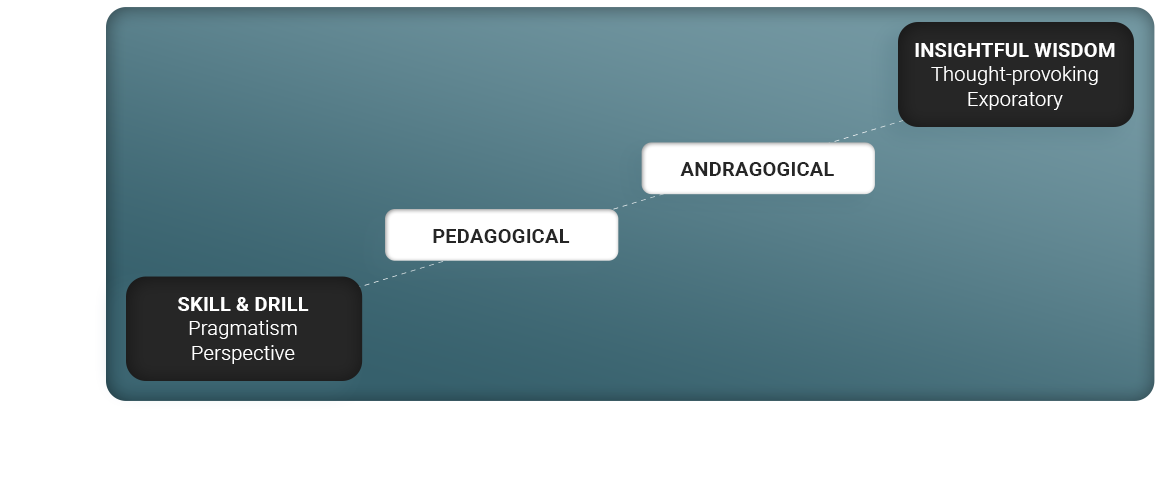Learning Spectrum
It is our belief that missed expectations are perhaps the single greatest cause of disappointment in life. It’s true in the small things, the big things, and everything in between, be it a lifelong relationship or a passing restaurant recommendation. It is also true in teaching, training, and development of all kinds, which is why we frequently share the Learning Spectrum with buyers to help them identify, assess, and manage their expectations and those of participants—primarily as they weigh, differentiate, and consider the range of cohort and classroom programs described herein.
In short, pedagogical learning is low theory, high (immediate) application. Regardless the format, the learning experience can be generally categorized as pragmatic (tangibly real-world), prescriptive (suggesting steps, methodologies, processes, if/then/do statements), and besotted in “skill & drill” work, be it role playing, practicing with a partner, small-group work in triads to employ what was just conveyed by an instructor, etc. Pedagogical learning absolutely has its place, is prevalent the world over, and is recognizable by every learner. In many school environments, children and youths learn their ABCs by song, by repetition, by memorization. We similarly learn counting tricks on our fingers, math tables in our heads, and are taught mnemonics and acrostics to remember that “IPMAT” is Isophase, Prophase, Metaphase, Anaphase, and Telophase. On and on it goes, this memorization and skill & drill to acquire, retain, and deploy what we have been taught, and it can be lifesaving, too, be it “Stop, Drop & Roll,” how to perform the Heimlich Maneuver, or tie a knot. If you want a visual image to keep in mind what pedagogical learning is, imagine a basketball player who practices free throws for hours on end. This repetitive habituation leads to outright “unforgettableness,” muscle-memory, and the ability to “make that shot without thinking.” In fact, too much thinking can sometimes get in the way. As they say, “The game is won or lost in that precious real estate between your ears.”
Andragogical learning is the opposite, characterized instead by higher theory and lower (immediate) application. Andragogical experiences tend to be insightful, thought-provoking, exploratory in nature (aka “ambiguous”), and wisdom-centric. What’s learned, or taught, or conveyed, or described by the person at the front of the room may not be immediately applicable, but it rings true, as do the conversations at one’s table to discern and ponder applications.
Andragogical learning defines, in large part, a great deal of philosophy, logic, and concepts that make a whole lot of sense but are virtually impossible to practice—much less master—without years of in-field experience, trying, failing, and distilling lessons from “the school of hard knocks.” What does it take to be a great leader? Great question. Think you know everything? Just wait. In fact: The more you learn, the less you’ll be certain of. Welcome to the great game of life.
Not better than—simply different than pedagogy—andragogy has its place. Luke had his Yoda, Garfield High Schoolers had their Jaime Escalante (from whom they pedagogically learned to use fingers for calculus, but andragogically learned trust and confidence over time). The same could be said of anyone who learned pedagogical skills from Mister Rogers or Sesame Street, then realized in adulthood they'd learned a whole lot andragogically, too.
Each of us is the sum of a great, complex combination of beliefs, knowledge, and experiences, and we have learned what we were taught—and acquired what we’ve experienced—through both pedagogy and andragogy. Without both, we would not have survived childhood and cannot thrive as leaders. As buyers of and participants in programs, it is important, therefore, to consider what one needs and expects from the learning experience. We’ve likely seen it all, from participants standing up and harrumphing out of the classroom because they were asked to role play, to buyers being angry because we didn't employ hours of role playing!
Like great cars or motorbikes, we can shift gears. As you envision the program or learning experience you have in mind, be mindful, too, of the Learning Spectrum. You’ll be glad you did, as will everyone who participates, because no amount of great teaching can overcome missed expectations.
